Blog: To Living Well
WATER: WHY ITS IMPORTANT FOR YOUR SKIN
We all know that water is vital for human life but did you know water plays an important role in the health of our skin? Our bodies are 70% water but as we grow older it can decrease to 50% by the time we're 70. It becomes harder for our bodies to retain water as we age which affects all of our organs including our skin. As the largest organ in our body, our skin is about 65% water so dehydration can seriously affect it. The water we ingest helps to keep our skin plump and moisturized. Without adequate hydration it can become dry, flaky, dull, sensitive and can age more quickly resulting in premature wrinkles and a loss of elasticity.
Drinking enough water is also important for flushing our system of toxins and bacteria that can increase the risk of skin problems. If you aren't properly hydrated your skin is unable to perform optimally. In the course of a day, our bodies lose a lot of water just through normal bodily processes including diffusion through our skin and even breathing! As a result, we need to replenish that water loss on a daily basis.
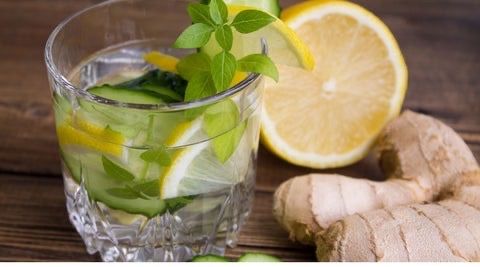
HOW WATER HELPS OUR SKIN:
Wrinkles are less obvious:
When we are properly hydrated, wrinkles and fine lines are less prominent because hydration improves skin elasticity. Hydrated skin cells are softer and will give the skin a plumper appearance.
Decreased Swelling:
Our skin can swell and become puffy when we are dehydrated because our bodies are trying to hold onto water. When the amount of water IN our cells is higher than the water OUTSIDE our cells, it creates an imbalance that leads to swelling or puffiness. Proper hydration helps to balance the water inside our cells with the water surrounding the cells.
Flushes Toxins:
Toxin producing bacteria can lead to skin conditions such as atopic dermatitis. Drinking enough water will flush the nasty toxins from our body which ultimately can improve our complexion.
Improves Dry Skin:
When dehydrated our skin will become more dry, cracked, irritated and can cause rashes/itchiness. I personally found this to be true: I once had a terrible rash all over my body. My doctor said I was dehydrated and that the rash would resolve if I drank more water. I thought that was ridiculous advice so to prove him wrong, I drank a lot of water that day. Later that evening the rash was gone! Lesson learned!
ph Balance:
Maintaining proper hydration can help keep our body's ph balanced. This is important for many reasons but ph imbalances can often be a factor in skin conditions such as psoriasis, acne and eczema.

HOW MUCH WATER DO I NEED ?
Well, that depends. The U.S. National Academies of Sciences, Engineering, and Medicine recommends about 11.5 cups of fluid per day for women. This includes not only water but also fluids from other beverages as well as food. However this is just a general rule. Your individual fluid needs can vary based on variables such as :
Exercise: Activities that cause you to perspire will result in extra fluid loss so you will need more fluid intake to replenish the loss.
Weather: Hot climates and high humidity can cause sweating and fluid loss.
Illness: Vomiting, diarrhea and high fevers can cause dehydration.
HYDRATION OPTIONS:
BEVERAGES:
Water isn't the only option for improving hydration. Sugar sweetened beverages are not a good option but if you're addicted to soda, try mixing half sparkling water with half unsweetened fruit juice. It's very refreshing and before you know it you won't miss that sugary soda. Coconut water, unsweetened juices, herbal teas and even milk are good fluid replacements. It used to be thought that the diuretic effect of coffee and tea caused dehydration. Apparently that has been debunked so coffee and tea can be counted as a fluid source but shouldn't be the bulk of your hydration plan.
WATER-RICH FOODS FOR HYDRATION:
A variety of foods can contribute to your hydration needs. Some of the following foods contain at least 85% water:
cucumbers, leafy greens, watermelon, celery, strawberries, melons, spinach, oranges, broth based soups, zucchini, tomatoes and peaches. Smoothies from water rich fruits and veggies are another great way to increase fluid intake.
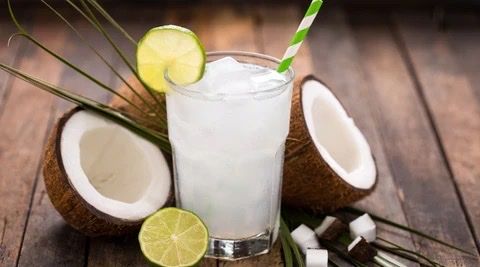
MORE TIPS:
- Consistency is the bottom line. Proper hydration needs to become a priority to have long lasting effects for your skin. To help remind yourself to drink more fluids, get a nice water bottle and take it with you in the car.
- If you don't have good tap water and you're not a fan of buying bottled water, buy a water bottle that comes with a filter. Brita, Larq and Berkey all sell water bottles with filters.
- Measure how much water you're bottle holds so you can keep track of how much you're drinking.
- Keep extra bottles in your car in case you run out of water without a convenient place to fill up.
- If you don't like plain water, add some sliced cucumbers, oranges, lemons or limes. Strawberries give water a really nice flavor too. Herbs like mint or basil are another option.
- Get started early in the day. Have a glass of water when first get up or with your breakfast.
- Make sure you drink while exercising and immediately after.
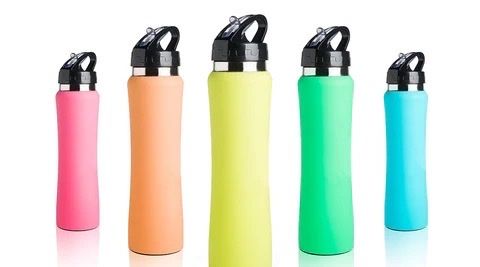
TO SUM IT UP:
The importance of adequate water consumption to obtain optimum skin health can't be stressed enough. It can slow the aging process and improve the appearance of your skin. Proper hydration is one of the most significant factors in maintaining beautiful skin.
So lift your glass and cheers to beautiful skin!
Tenli
----------------------------------------------------------------------------------------------------------------------------------------------------------------------------------
INFLAMMATION 101
WHAT IS INFLAMMATION?
You may have been hearing a lot about inflammation lately but not understand why. So let's do a deep dive on inflammation. We have all experienced acute inflammation at some point in our lives. Inflammation is the body’s normal immune response to injury or infection and is the beginning of the healing process. What you may not know is there are two types of inflammation: acute and chronic.
Acute inflammation occurs after a cut, sprained knee, sunburn or strep throat. It usually only lasts a few days. Common signs are: redness, warmth, swelling, pain, and limited function( like limping). It may also be accompanied by fever, general malaise, or a change in blood pressure or pulse. Acute inflammation is good because it causes your immune system to kick in and take care of the problem.
Chronic inflammation occurs when your body is no longer capable of turning off the inflammatory response resulting in damage to normal healthy tissue and ultimately cellular destruction. Chronic inflammation can last several months to years and lead to diseases and medical conditions such as:
- CANCER
- HEART DISEASE
- RHEUMATOID ARTHRITIS
- CROHN’S DISEASE AND ULCERATIVE COLITIS
- TB
- ASTHMA
- CHRONIC PERIODONTITIS
- ALL OTHER AUTO-IMMUNE DISEASES
- SKIN CONDITIONS

CAUSES OF CHRONIC INFLAMMATION:
1. CANDIDA ALBICANS OVERGROWTH:
Candida Albicans is a yeast (fungus) that lives in the human GI tract. When there is Candida overgrowth it can cause infection leading to Leaky Gut Syndrome. Leaky Gut Syndrome occurs when tiny holes appear in the intestinal lining. This allows harmful microorganisms to pass through the intestinal wall into the circulatory system, causing the body to activate the immune system and systemic inflammation begins. Food allergies are linked to leaky gut and candida overgrowth.
2. NUTRTIONAL DEFICIENCIES:
Vitamin B especially 6 and 12, zinc, Magnesium.
3. OBESITY
People who are obese are more likely to have high levels of white blood cells, a marker for inflammation. Inflammation is also higher in obese people increasing their risk of cancer.
4. CHRONIC ANXIETY AND STRESS:
Persistant stress/anxiety causes high cortisol levels which is implicated in chronic inflammation.
5. EXPOSURE TO TOXINS:
Air pollution, exposure to cigarette smoke, heavy metals like mercury and lead, pesticides in food, chemicals in consumer goods, polluted water.
6. FOOD ALLERGIES:
This can be actual food allergies but also food sensitivity. Food allergies can also manifest in skin problems.
7. LACK OF EXERCISE:
Moderate exercise lowers inflammation.

SYMPTOMS OF CHRONIC INFLAMMATION:
- CHRONIC PAIN
- DEPRESSION
- CONSTANT FATIGUE
- BLOOD SUGAR ISSUES
- CHRONIC STOMACH PROBLEMS
- ASTHMA/ALLERGIES
Not everyone who has chronic inflammation will have all these symptoms. However, if you have ANY of these symptoms OR an auto-immune disease, you probably have chronic inflammation so it might be beneficial to talk to your doctor.

DIAGNOSTIC TESTS:
- HOMOCYSTEINE
- BLOOD FERRITIN
- HDL
- BLOOD GLUCOSE
- WHITE BLOOD CELLS
- SED RATE
- HIGH SENSITIVITY C-REACTIVE PROTEIN ( HS-CRP)
These tests can help your doctor determine if you have chronic inflammation.
WHAT YOU CAN DO TO HEAL YOUR BODY AND/OR PREVENT CHRONIC INFLAMMATION:
MODERATE EXERCISE
FIND HEALTHY WAYS TO DEAL WITH YOUR STRESS
DECREASE CONSUMPTION OF ALCOHOL, CAFFEINE, NICOTINE
CONSIDER ANTI-INFLAMMATORY HERBS AND SUPPLEMENTS:
BOSWELLIA (FRANKINCENSE), GINGER, TURMERIC, DEVIL’S CLAW, CAT’S CLAW, VITAMIN B COMPLEX, MANGOSTEEN, MILK THISTLE, ZINC, MAGNESIUM, SPIRULINA
CLEAN UP YOUR PERSONAL ENVIRONMENT:
Get rid of toxic cleaners and try green cleaning products or make your own, switch to personal care products and foods that don’t contain irritants. Consider getting a water filter for your home.
AVOID OR LIMIT INFLAMMATION CAUSING FOODS:
- DAIRY
- BEEF (ESPECIALLY GRAIN FED BEEF)
- SUGAR
- GLUTEN
- MSG
- OMEGA 6 VEGETABLE OIL
- ARTIFICIAL SWEETENERS
- SAT FATS
- TRANS FATS
- ARTIFICIAL ADDITIVES/PRESERVATIVES
ADD THESE INFLAMMATION FIGHTING FOODS TO YOUR DIET:
- FLAX AND CHIA SEEDS
- GREEN TEA
- WALNUTS
- BERRIES AND CHERRIES
- PINEAPPLE
- GREENS: SPINACH, KALE, LEAFY LETTUCE
- BROCCOLI
- SALMON
- GARLIC, TURMERIC, GINGER
Whether you have one symptom of chronic inflammation or full blown disease, it’s never too late to make changes to decrease the inflammation in your body. I would love to hear from you.If you deal with chronic inflammation please share your thoughts and experiences.
Be well friends,
Tenli
---------------------------------------------------------------------------------------------------------------------------------------------------------------------------------
OATMEAL IS LIKE PASTA
What? How is oatmeal like pasta? Glad you asked. Oatmeal, like pasta is a blank canvas with endless possibilities! There are a million ways to prepare oatmeal or pasta so it never gets boring.
HEALTH BENEFITS OF OATMEAL:
- Oatmeal contains a type of soluble fiber called beta glucan. Soluble fiber is known to be very helpful in reducing cholesterol and oats are one of the best sources of soluble fiber.
- Beta glucan can boost your immune system and has been studied for its use as a cancer treatment.
- Because of its high fiber content oatmeal has a low glycemic index. That means its sugar content is released slowly into the bloodstream so it helps stabilize blood sugar.
- Oatmeal doesn't digest quickly so you feel full for a longer period of time.
- Oatmeal contains a type of antioxidant called avenanthramides found almost exclusively in oats. Antioxidants are important for their ability to protect against free radicals that destroy our body's cells.
- Oats have all the macros: complex carbs, healthy fats AND 6 grams of protein in 1/2 cup dry oatmeal.
A FEW TIPS:
- Try to avoid instant or 1-minute oatmeal. They have a higher glycemic index so they won't stabilize your blood sugar as well as rolled oats or steel cut. They also won't keep you full as long.
- Stay away from the oats that are flavored as they will have a lot of added sugar and artificial flavors.
- Steel cut oat take a long time to cook on the stove so I bought a small crockpot and a timer. I get my steel cut oats ready the night before, plug the crockpot into the timer, set the timer and my oatmeal is perfectly cooked when I get up in the morning.
- You can cook one serving of rolled oats in the microwave in 2 minutes. Just make sure your bowl is big enough that it won't boil over.
So now that you know how good oatmeal is for you let's explore how to make it interesting. Most of us probably grew up eating oatmeal with a few raisins and some brown sugar mixed in and that's how most restaurants serve it. In my opinion that's really boring. We can do better than that.
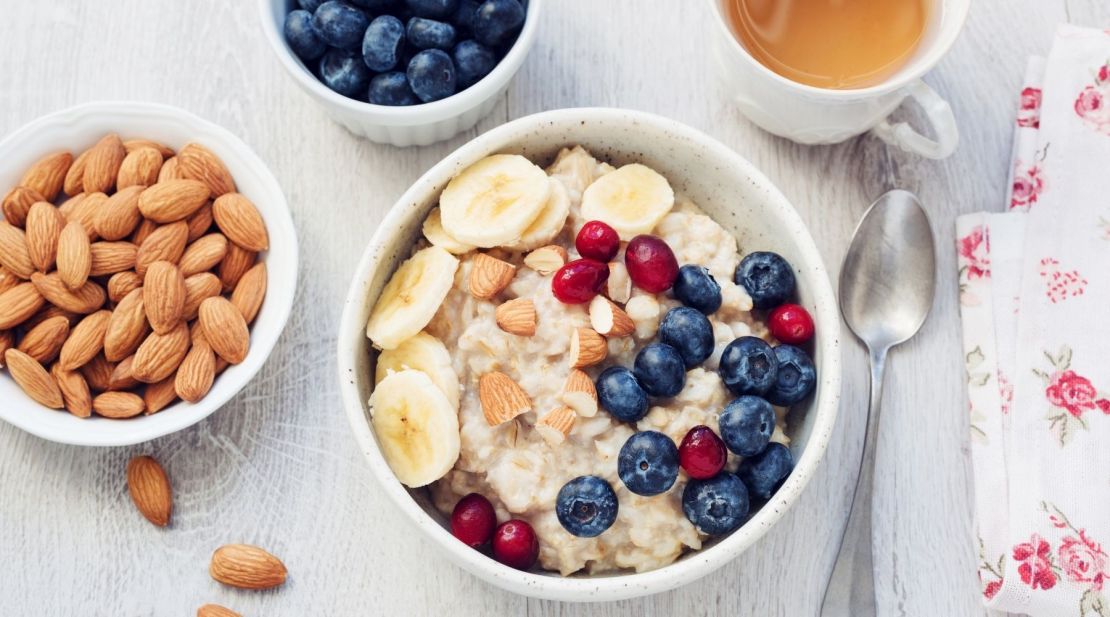
MY GO TO OATMEAL:
This is what I have most mornings when I am in a hurry:
1/3 cup rolled oats
2/3 cup filtered water
2 Tablespoons flax meal
a pinch of pepper
1/4 teaspoon turmeric and cinnamon
It all goes in a bowl in the microwave for 2 minutes.
When it's done I add a scoop of my homemade granola, a handful of fresh berries and a splash of oat or cashew milk. Its got everything: additional protein from the nuts in the granola, antioxidants from the turmeric, cinnamon and berries and extra fiber plus Omega-3 fats from the flaxseed.
MORE WAYS TO BOOST YOUR PLAIN OATMEAL:
- chocolate-cherry oatmeal: Add fresh or dried cherries, unsweetened cacao powder and date or maple syrup
- apple-cinnamon: Add unsweetened applesauce, chopped apples, chopped walnuts, cinnamon and maple syrup
- Pumpkin pie: Add pumpkin puree, a little cinnamon and nutmeg and chopped pecans
- PB&J: Add peanut butter and your favorite jam and crushed berries
- Classic: Add bananas, raisins, a bit of brown sugar and chopped walnuts
- Superfood: Add flaxseed, chia seed, blueberries, goji berries and cinnamon

OVERNIGHT OATS:
Over night oats have recently become quite popular. Even Starbucks has it on their menu. Super easy: you mix rolled oats, a liquid and whatever mix-ins you want in a mason jar. Leave it in the fridge overnight and the next morning you have a creamy, oat-y yummy breakfast waiting for you! No cooking involved plus you can make enough for 2-3 days at one time. Doesn't get easier than that! Here is the basic recipe:
One serving:
1/2 cup Milk or plant Milk
3/4-1 Tbsp Chia Seeds
1/2 cup Rolled Oats
1/4 cup yogurt (optional for a creamier texture, can use coconut yogurt)
1 tablespoon date syrup, coconut sugar, honey or maple syrup if you want a little sweetness
Add everything to a mason jar. Mix well. Cover and leave it int the fridge overnight.
OVERNIGHT OAT VARIATIONS:
These are just a few ideas to get you going but get creative!
Carrot cake: Add grated carrots, chopped walnuts, dried cranberries or raisins, 1/4 teaspoon vanilla.
Blueberry Lemon: Add blueberries, a little lemon zest and some honey
Strawberry cheesecake: Add strawberries (diced), vanilla yogurt
Chocolate peanut butter: Add 1-2 tablespoons peanut butter or almond butter, cacao powder, honey
Pumpkin pie: Add canned pumpkin, cinnamon, nutmeg, chopped pecans and maple syrup
Elvis Presley: Add mashed banana, peanut butter and honey
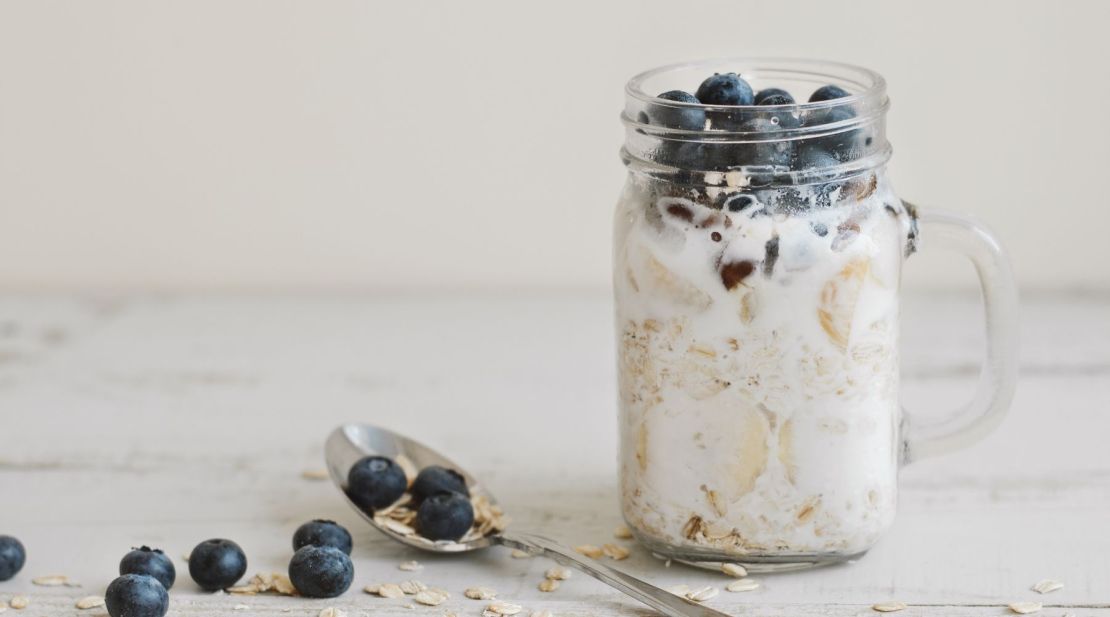
FAQ:
How long do overnight oats last?
Overnight oats can be prepared up to 2-3 days in advance, but you may want to add fresh fruit at the last minute other wise it might get too mushy if left for 3 days.
Why chia seeds?: they become gel-like when soaked and adds to the creaminess but also adds fiber, protein, omega-3 fats and antioxidants
Can I use a different milk?: definitely. any plant milk or cows milk works just fine.
Do I have to eat it cold?: Although it's wonderfully refreshing on a hot summer morning, you might want something warmer on a chilly day. To warm it simply put it in a bowl and warm in the microwave for about 60 seconds. Just make sure the bowl is large enough that it won't overflow. You can also heat it up on the stove.
Can I make a larger serving?: Yes, just add everything into a large bowl. Mix well and then divide into individual serving jars with lids before refrigerating.
LARGE BATCH STEEL CUT OATS:
Steel cut oats have a completely different texture than rolled oats. Steel cut oats are little nuggets and much harder than the flat, thin rolled oats so they take longer to cook but are really nice for a change of pace. I really like the chewy, hearty texture. They have a little more fiber and are slightly lower on the glycemic than rolled oats. However steel cut oats take 30-40 minutes to cook on the stove so I recommend cooking them in a crockpot overnight. The following recipe is really nice during the holidays especially if you're feeding several people. You can keep any leftovers in the fridge up to 4-5 days.
PUMPKIN OATMEAL:
2 cups steel cut oats
7 cups water
1 can (15 oz.) pumpkin
1 teaspoon cinnamon
1/2 teaspoon ground cloves
1 tablespoon vanilla
Add everything to a crockpot. Cook on low 5-6 hours but can be as long as 8 hours. To serve: add sliced bananas, maple syrup and chopped pecans or walnuts. I plug a timer into the crockpot and let it cook overnight.
If you've never been a fan of oatmeal I hope this has inspired you to give it another try. Remember: oatmeal is just like pasta! Feel free to share your favorite oatmeal recipes!
Be well, friends!
Tenli
---------------------------------------------------------------------------------------------------------------------------------------------------------------------------------